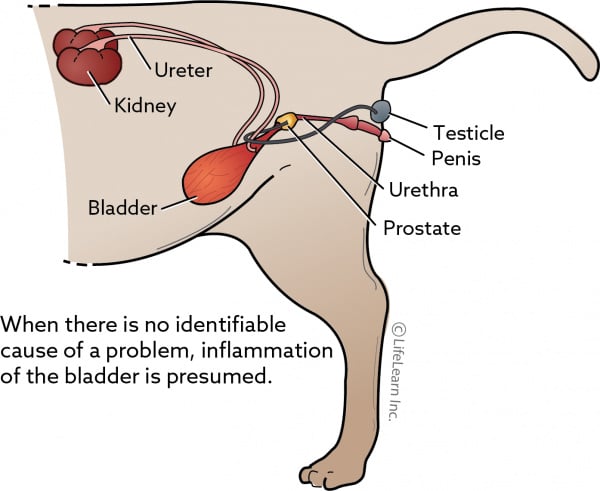Interstitial Cystitis May Be the Problem
Interstitial cystitis is one of most mysterious of feline diseases to manage and treat. Part of the problem lies in the fact that the symptoms of this illness can be so vague and broad that pinpointing the correct diagnosis can be difficult. The usual victims of interstitial cystitis are young male cats, although females can also suffer from this as well. Many cats who are afflicted with FIC usually outgrow it eventually.
Symptoms of Interstitial Cystitis
Diagnosis of interstitial cystitis is usually made on a basis of the symptoms that the cat is presenting. In most cases, there is no sign of infection, but your veterinarian will suspect interstitial cystitis if you cat is showing some of these symptoms:
- Straining when he tries to urinate.
- Urinating with great frequency, with sleep disturbed by the need to urinate.
- Blood will usually be present in the urine.
- The symptoms appear when the cat is subjected to stress.

Causes of Interstitial Cystitis
Research is still underway to understand exactly what causes interstitial cystitis in cats. No one theory of the cause of this condition has been absolutely agreed upon, but several lines of thought have been proposed. The nervous system appears to play a major role.
- The nerves that serve the bladder may have become inflamed. Some veterinarians believe that stress alone is responsible for this inflammation, while other think that an irritated bladder lining begins the cycle.
- The bladder is provided with a protective coating of mucus, which keeps the waste products filtered out by the kidneys from causing it to become irritated. If the mucus is somehow damaged, harm can be done to the bladder wall, causing inflammation.
- Stress is just as harmful to cats as it is to humans, and flare-ups of interstitial cystitis are often linked to a stressful situation, particularly with cats that remain indoors exclusively or in multi-cat households.
Treatment
Despite the severity of interstitial cystitis, it is one of the more difficult of urinary tract diseases to treat successfully. Antibiotics are generally useless in providing relief, although a bacterial infection should be ruled out to begin with.
Most veterinarians treat interstitial cystitis with anti-inflammatory drugs such as prednisone. These help to reduce inflammation. Anti-inflammatories are usually given in combination with pain relievers. Another approach, since stress appears to be a major factor, is to give the cat antidepressants and anti-anxiety medications. To help heal the bladder and make it less susceptible to damage, your vet may prescribe drugs that will help restore and strengthen the mucus coating.
You can help to prevent a recurrence of interstitial cystitis by feeding the cat canned food and making sure that he or she drinks plenty of water. Making the home more relaxed and providing toys and attention can also help to keep your cat free of FIC
More about Feline Idiopathic Cystitis

